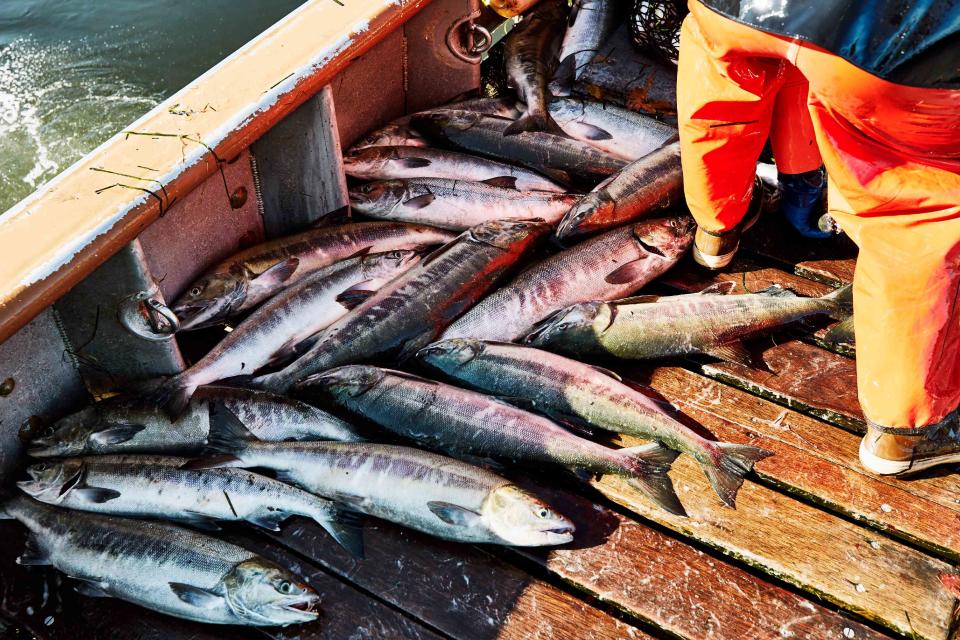California Canceled Salmon Fishing Season: Here's How Restaurants Are Adapting
This year marks just the second time in history that California’s salmon fishing season has been canceled.

Thomas Barwick / Getty Images
Fishing fleets along the California coast have brought in anywhere from 100,000 to 300,000 Chinook, also known as king salmon, in recent years. This year, that number will be zero as The Pacific Fishery Management Council announced a shutdown for all local salmon fishing.
Why is salmon season canceled?
“Climate change has created bigger droughts, longer drought years, and that’s affecting the habitat of the Chinook, which need high water flows,” described Bryan Boches, co-founder of Safe Catch, a sustainable seafood company. Salmon hatch in rivers and then swim out to sea, returning in three years. “When you have a drought year in combination with dam projects and deforestation, there’s simply not enough water flow and the water gets too warm,” Boches continued.
The droughts in 2020 and 2021 left salmon hatchlings unable to survive in the shallow, warm water. Tensions over the division of the remaining water between fishing and agricultural communities exacerbated the issue.
Will the season reopen next year?
Many species have evolved to cope with climate shifts over the centuries but it’s difficult to withstand rapid, extreme changes. While drought was the primary cause of this year’s cancellation, fishing fleets are looking ahead to how flooding and unusual snowfall melt will affect the future of Chinook.
“We’re not anticipating a robust fishery by 2024 or 2025,” said Oakland-based salmon captain Sarah Bates. “What we would really like to see is a lifecycle model that takes into account the water temperature and water flows in the river, and the feed conditions in the ocean, during the entire three-year [lifecycle]. That’s not available yet.”
Bates, however, remains optimistic about the hatchlings in the Sacramento River this spring as the winter rains and spring melt brought the levels of water back up from the drought.
Related:A Guide to Every Type of Salmon You Can Buy
What does this mean for restaurants that serve salmon?
Annual fish sales in California are valued at $460 million with most of the spend going towards Chinook. While the ban drastically affects the livelihoods of fishing fleets in California, it may not necessarily change how restaurants approach their menus.
“As a restaurant owner, Chinook is one of those golden ticket items that our customers ask for, especially being a restaurant that only serves wild caught fish,” explained Annemarie Brown-Lorenz of The Fishery in San Diego, CA. The restaurant has already pivoted to purchasing from out of state, primarily in Washington and Alaska.
Brown-Lorenz’s husband, Nicholas Lorenz, is the general manager of Pacific Shellfish Wholesale Seafood and has noticed that sales of king salmon had already dropped last year. “Of our 120+ accounts, 30 of them bought California king salmon last year. 16 of those were retailers and grocers and 14 were restaurants,” he said. Lorenz predicts that the number of restaurants ordering salmon will reduce sharply because of higher price points and inconsistent availability.
Passionfish Restaurant in Pacific Grove, has been a longstanding purveyor of sustainable seafood, never buying tuna or swordfish and recognizing the scarcity of local salmon early on. “We’ve rarely offered local salmon because stocks have been so low. Our guests know we’re not going to offer farmed salmon but they also know that we’re not going to offer something that has low stocks or is banned,” general manager Jannae Lizza stated.
When Passionfish does offer salmon on its menu, it also sources from Alaska. “Obviously, we would wish that restaurants would support their local fisheries but if you have to have salmon then we wholeheartedly support the Alaska fishery,” Captain Bates agreed. “It's really sustainable with wild fish in a healthy and well-managed ecosystem.”
With her income drastically affected by the closure of salmon season, Bates advises restaurants and diners to consider buying other local fish, like halibut, black cod, and rockfish. Chef Davin Waite of Oceanside's Wrench and Rodent Seabasstropub and Shootz Fish & Beer has a similar mindset. "A long standing belief of mine is that if we diversify what we eat it takes pressure off the more commonly eaten species. If we leave Mother Nature alone, even for a little while she has a tendency to bounce back. This is a perfect opportunity to try that fish you’ve never eaten before and expand your horizons."
Waite plans to serve sheepshead, sablefish, rockfish and his favorite, “the humble mackerel” to name a few.
For more Food & Wine news, make sure to sign up for our newsletter!
Read the original article on Food & Wine.

